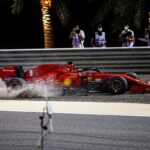The unexpected resignation of Christian Horner from Red Bull Racing the previous week triggered considerable commotion within the Formula 1 community, but this occurrence does not alter the immediate circumstances for the team, which is predicted to face its least impressive showing in the constructors’ standings since 2015.
Regardless of the ultimate catalyst for Horner’s departure, resulting from a series of contributing elements, the palpable decline of Red Bull since its benchmark-setting 2023 season has been remarkably evident.
Periods of dominance tend to fluctuate, often corresponding with modifications in regulations. Red Bull’s preceding era concluded as F1 transitioned to hybrid technologies in 2014, leading to Mercedes’ ascension until the 2022 switch to vehicles utilizing ground-effect principles.
However, Red Bull’s more recent downturn emerged with surprising rapidity, particularly under conditions of stable regulations, rendering it more difficult to interpret. As of the midpoint of the 2025 season, the team has descended to fourth position in the rankings with 172 points, trailing Mercedes in third place by 38 points and Ferrari by 50 points. McLaren, the commanding frontrunner, holds a substantial lead with 460 points.
| Year | Red Bull’s finishing position |
| *2025 | *4th |
| 2024 | 3rd |
| 2023 | 1st |
| 2022 | 1st |
| 2021 | 2nd |
| 2020 | 2nd |
| 2019 | 3rd |
| 2018 | 3rd |
| 2017 | 3rd |
| 2016 | 2nd |
| 2015 | 4th |
*Season still happening
This situation implies that Red Bull is currently positioned to achieve its least favorable constructors’ championship outcome since its fourth-place finish in 2015, during a transitional phase featuring Daniel Ricciardo, Daniil Kvyat, and Renault engines. Consequently, what prospects does the team possess for averting this unwelcome result?
Short-term perspective
Encompassing a catastrophic event in Barcelona, an initial-lap retirement in Austria, and a difficult wet race in Silverstone, Verstappen’s more immediate results have contrasted adversely with the anticipated performance of both himself and his RB21 vehicle.

Max Verstappen, Red Bull Racing
Photo by: Sam Bagnall / Sutton Images via Getty Images
Verstappen secured tenth position in Spain after incurring a self-imposed penalty, experienced removal by Andrea Kimi Antonelli at the Red Bull Ring, and faced difficulties in surpassing fifth place in the British rain following a markedly unsuccessful low-downforce configuration. Consequently, the reigning world champion has been outscored by Nico Hulkenberg of Sauber over the past four races.
Verstappen’s pole position in dry conditions at Silverstone hints that this statistical deviation will soon dissipate, potentially placing him back into contention for podium finishes in Belgium the following week. Further enhancements are anticipated for Red Bull at Spa-Francorchamps, promising incremental gains in the RB21’s overall performance.
Persistent challenges for Red Bull involve car balance and heightened tire degradation, particularly on circuits with protracted, high-downforce corners—a scenario that does not bode favorably for Hungary in August. However, under hotter conditions, Verstappen retains a strong likelihood of surpassing the Mercedes cars, which continue to exhibit difficulties in elevated temperatures.
The second seat factor
While Verstappen otherwise maximizes the potential of his equipment, the underlying concern for Red Bull continues to be the same factor that impeded its constructors’ ambitions in the previous season. In comparison to the Dutchman’s 165-point accumulation, which has maintained him as the third-highest scoring driver outside of McLaren, Yuki Tsunoda has only contributed seven points for Red Bull thus far, and increasingly seems to lack both confidence and viable solutions.
Red Bull has come to the determination that further alterations to the driver lineup would likely impede rather than enhance its prospects. Under the supervision of incoming team principal Laurent Mekies, Tsunoda is under a new superior who has observed the Japanese driver’s capabilities at the affiliate Racing Bulls team, advocating for his promotion after Horner’s most recent gamble involving Liam Lawson failed to produce favorable outcomes.
However, if Red Bull aims to effectively compete against Mercedes and Ferrari, Verstappen necessitates assistance—and in a timely manner. According to advisor Helmut Marko, typically not inclined to gloss over subpar driver performances, Tsunoda has displayed underlying progress, leading to an expression of “hopefulness” that this progress will materialize into tangible results soon.

Yuki Tsunoda, Red Bull Racing Team
Photo by: Andy Hone / Motorsport Images
“Yuki encountered challenges during some GP weekends, although an upward trajectory became apparent in England: the disparity with Max diminished in most free practice sessions, and he managed to start from eleventh position on the grid,” affirmed Helmut Marko in his Speedweek column.
“We engaged in thorough discussions with Yuki; he collaborates with sports psychologists. Unfortunately, mirroring Max’s experience, he lacked opportunities in the race given this wing. Nonetheless, we observe performance improvements, expressing optimism that these will translate into points soon.”
Verstappen: “We can’t compete at every track”
Marko contended that Verstappen’s individual title campaign remained ongoing. “We are far from dismissing the title prospects,” he added. “We have 12 grand prix events and four sprint races remaining, equating to 300 world championship points from the GPs and 32 from the sprint races.
“Considering this perspective, and further enhancements anticipated for Belgium designed to narrow the gap with McLaren, we remain confident in our pursuit of the world championship.”
This assertion diverges somewhat from Verstappen’s own sentiments, indicating that while his new Red Bull floor proved beneficial, he remains considerably distanced from mounting a consistent challenge against Lando Norris and Oscar Piastri under various conditions. The latest floor specification did not fully mitigate crippling understeer for Red Bull, necessitating a risky choice of a lower downforce rear wing to compensate.
“Within our team, some individuals maintain an optimistic outlook, but reality dictates otherwise,” explained Verstappen. “It has become evident that we cannot effectively compete at every track.
“Silverstone’s high-speed corners suit us relatively well, although few tracks on the calendar resemble Silverstone. Consequently, assessing the average across all tracks, we remain somewhat deficient.
“Races depend on tire management, an area where we have faced challenges in the past year, particularly in comparison to McLaren. Resolving this deficiency poses difficulties. Updates yield improvements, yet they remain insufficient. We are exerting maximum effort, including myself and the entire team, to enhance our competitiveness.”
In this article
Be the first to know and subscribe for real-time news email updates on these topics
Subscribe to news alerts










